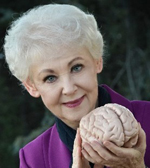Magic of Emotional Intelligence - Part 10
EQ & Leadership
©Arlene R. Taylor, PhD www.ArleneTaylor.org
 The concept of leadership is complex. After all, there are billions of brains on Planet Earth and probably as many ways to “lead” as brains thinking about it.
The concept of leadership is complex. After all, there are billions of brains on Planet Earth and probably as many ways to “lead” as brains thinking about it.
In adulthood, you provide leadership for yourself: your decisions, behaviors, and choices when relating with others. If you are a parent, you provide leadership for younger family members; if a teacher, for your students. In business, you can provide leadership for a department, project, or the entire organization.
Leadership styles reflect one’s level of EQ skills and ability to role-model them. Leadership success involves the interplay between one’s Intelligence Quotient (IQ) and one’s level of Emotional Intelligence (EQ).
Although not a fixed number, IQ represents a range of largely inherited potential academic intelligence. EQ is a set of learned skills that are distinct from, but complementary to, academic intelligence. This IQ-EQ interplay is affected by many factors: one’s generational biological inheritance, past experiences, the impact of closest friends (especially those with whom one spends the most time), willingness to learn, and a personal choice to build EQ skills.
Based on the Success Quotient (SQ) formula—IQ plus EQ equals SQ—estimates are that IQ contributes only about 20 percent to one’s overall success in life, while EQ skills contribute about 80 percent. Studies in the workplace have shown that successful leaders tend to exhibit high levels of EQ skills—although their IQ levels are often average. Less successful leaders often have a high IQ but low levels of EQ skills.
According to Dr. Daniel Goleman, “CEOs are hired for their intellect and business expertise and fired for a lack of emotional intelligence.”
Without high EQ skills, leadership reflects the individual’s own family-of-origin issues, the spoken and unspoken rules handed down, unidentified and/or unhealed woundedness, and past personal experiences—all packaged in layers of cellular memory from 3 to 4 previous generations of biological ancestors.
Healthy, functional, and successful leadership requires solid EQ skills. Top leadership performers tend to use both IQ and EQ skills. Refer to Part 2 of this series for examples of high EQ behaviors. How many do you need to build? The sky is the limit.